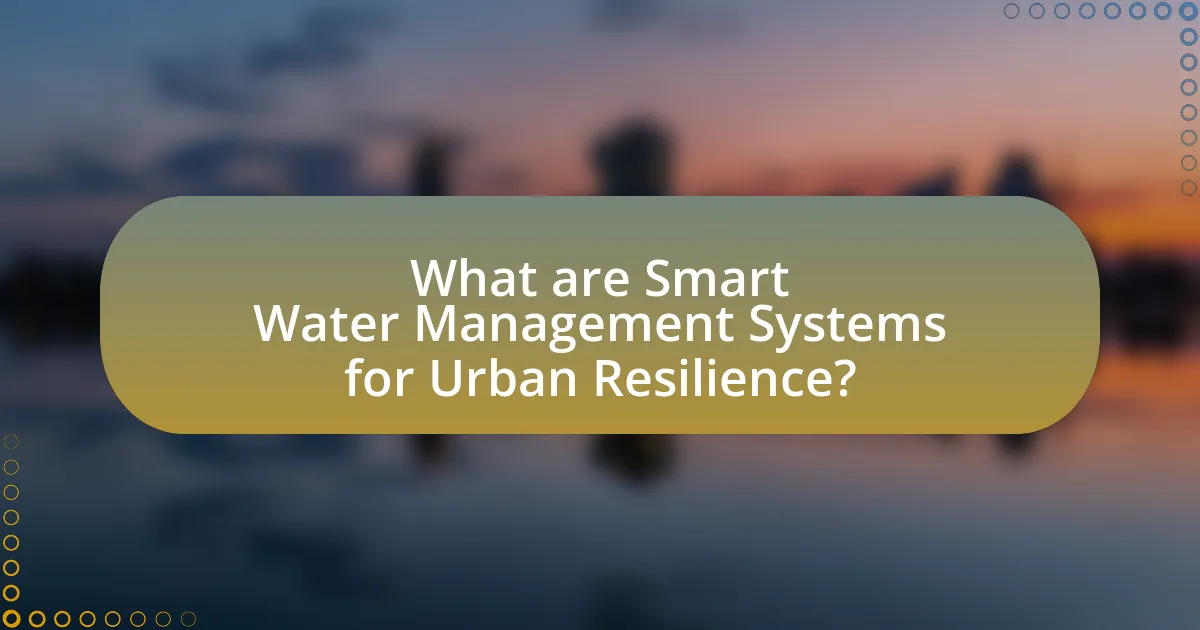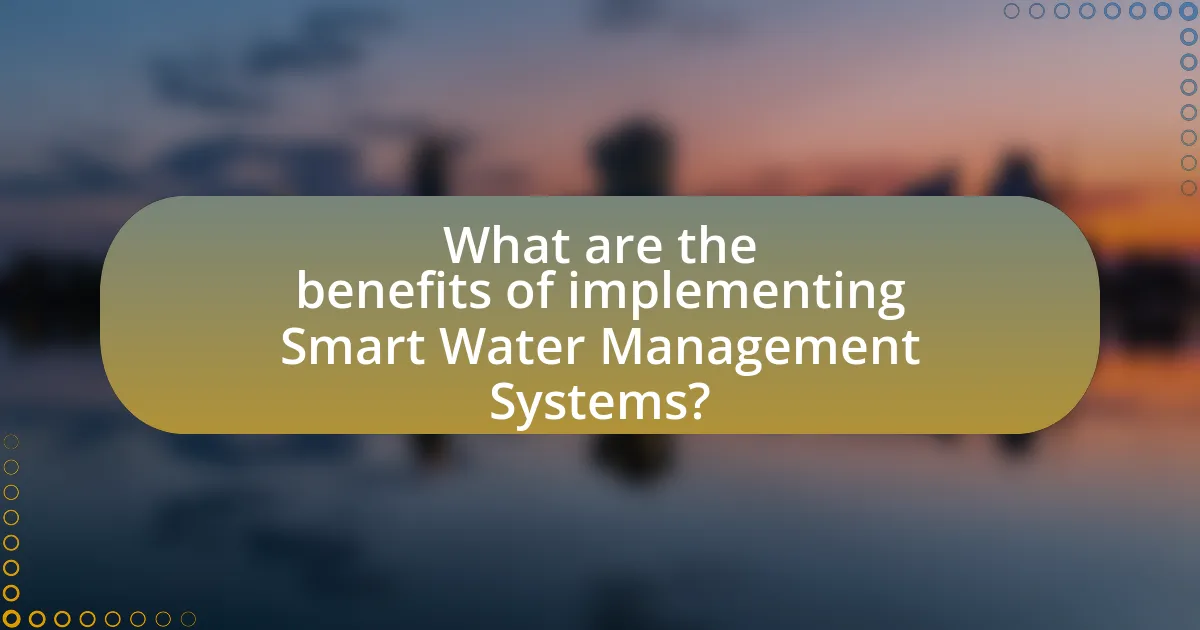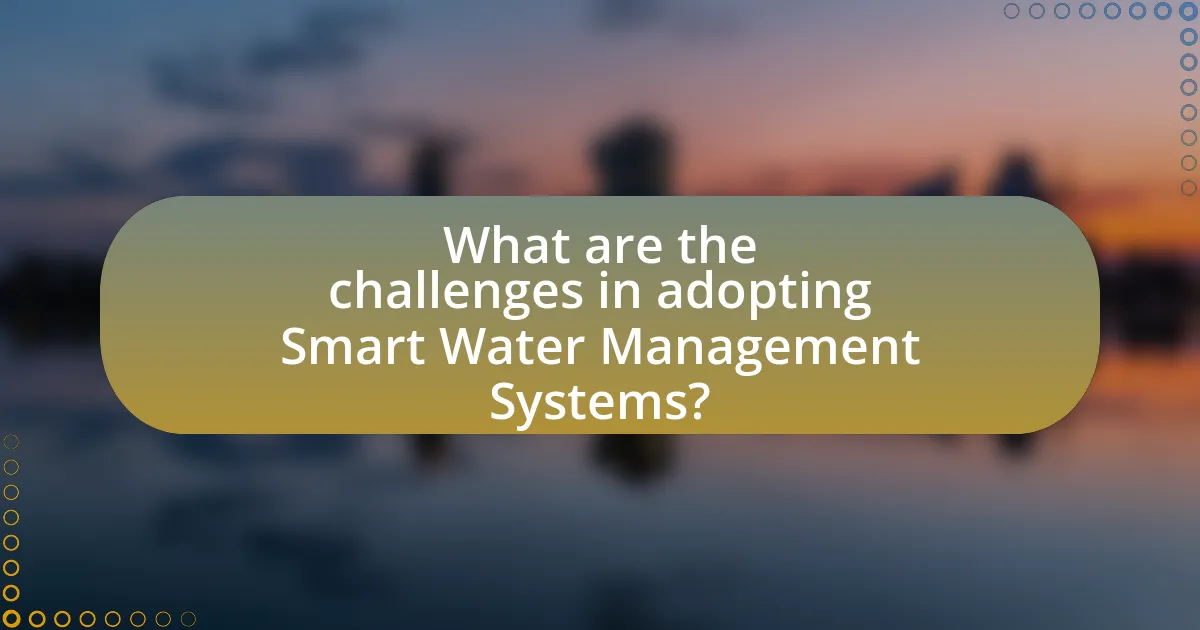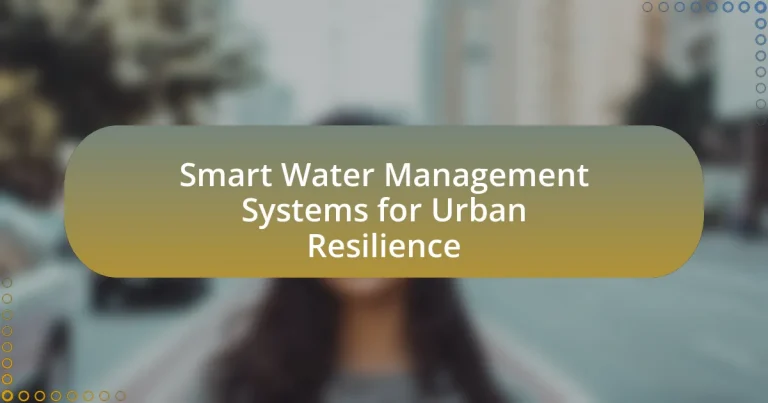Smart Water Management Systems for Urban Resilience are advanced frameworks that leverage technology to enhance water resource management in urban areas, improving their capacity to cope with environmental challenges. These systems utilize real-time monitoring, data analytics, and automated controls to optimize water distribution, reduce waste, and manage stormwater effectively. Key components include IoT sensors, Geographic Information Systems (GIS), and advanced metering infrastructure, which collectively contribute to increased efficiency, reduced operational costs, and improved water quality. The article explores the functioning, benefits, challenges, and future trends of these systems, emphasizing their critical role in promoting sustainable urban development and enhancing public health and safety.

What are Smart Water Management Systems for Urban Resilience?
Smart Water Management Systems for Urban Resilience are integrated frameworks that utilize advanced technologies to optimize water resource management in urban areas, enhancing their ability to withstand and recover from environmental stresses. These systems employ data analytics, real-time monitoring, and automated controls to improve water distribution, reduce waste, and manage stormwater effectively. For instance, cities implementing smart water management have reported reductions in water loss by up to 30% through leak detection technologies and improved infrastructure management. This approach not only conserves water but also mitigates flooding risks, thereby contributing to the overall resilience of urban environments against climate change and population growth challenges.
How do Smart Water Management Systems function in urban environments?
Smart Water Management Systems function in urban environments by utilizing advanced technologies such as sensors, data analytics, and automated controls to optimize water distribution and usage. These systems monitor water quality and quantity in real-time, enabling efficient management of resources and reducing waste. For instance, according to a study by the International Water Association, cities implementing smart water technologies have reported up to a 30% reduction in water loss through improved leak detection and management. Additionally, these systems facilitate better decision-making by providing actionable insights based on data collected from various sources, ultimately enhancing urban resilience against water-related challenges.
What technologies are integrated into Smart Water Management Systems?
Smart Water Management Systems integrate various technologies including Internet of Things (IoT) sensors, data analytics, Geographic Information Systems (GIS), and advanced metering infrastructure (AMI). IoT sensors enable real-time monitoring of water quality and flow, while data analytics processes the collected data to optimize water usage and detect leaks. GIS provides spatial analysis for better planning and management of water resources, and AMI facilitates remote reading of water meters, enhancing billing accuracy and customer engagement. These technologies collectively improve efficiency, reduce waste, and support sustainable urban water management.
How do these technologies enhance water management efficiency?
Smart water management technologies enhance water management efficiency by utilizing real-time data analytics, IoT sensors, and automated control systems to optimize water distribution and usage. These technologies enable precise monitoring of water quality and quantity, leading to reduced waste and improved resource allocation. For instance, a study by the International Water Association found that implementing smart meters can reduce water consumption by up to 15%, demonstrating significant efficiency gains. Additionally, predictive analytics can forecast demand and detect leaks promptly, further minimizing losses and ensuring sustainable water supply management.
Why are Smart Water Management Systems crucial for urban resilience?
Smart Water Management Systems are crucial for urban resilience because they enhance the efficiency and reliability of water supply and distribution, particularly in the face of climate change and urbanization challenges. These systems utilize advanced technologies such as sensors, data analytics, and real-time monitoring to optimize water usage, reduce waste, and improve response times to water-related emergencies. For instance, cities employing smart water management have reported reductions in water loss by up to 30%, which directly contributes to sustainable resource management and disaster preparedness. By ensuring a stable water supply and minimizing disruptions, these systems play a vital role in maintaining public health and supporting economic stability in urban environments.
What challenges do urban areas face regarding water management?
Urban areas face significant challenges regarding water management, including infrastructure inadequacies, pollution, and climate change impacts. Aging infrastructure often leads to leaks and inefficiencies, with the American Society of Civil Engineers estimating that U.S. cities lose about 6 billion gallons of treated water daily due to leaks. Pollution from industrial runoff and sewage overflows contaminates water sources, posing health risks and increasing treatment costs. Additionally, climate change exacerbates water scarcity and flooding, with urban areas experiencing more extreme weather events, which can overwhelm existing drainage systems. These factors collectively hinder effective water management and threaten urban resilience.
How do these systems mitigate the impacts of climate change?
Smart water management systems mitigate the impacts of climate change by optimizing water usage, enhancing flood management, and improving water quality. These systems utilize real-time data analytics and IoT technology to monitor water resources, allowing for efficient allocation and conservation of water, which is crucial during droughts. For instance, cities employing smart water management have reported reductions in water consumption by up to 30%, thereby conserving vital resources. Additionally, these systems can predict and manage stormwater runoff, reducing the risk of urban flooding, which is exacerbated by climate change. Research indicates that cities implementing such systems have experienced a decrease in flood-related damages by as much as 40%. Furthermore, smart water management enhances water quality by detecting contaminants early, ensuring safe drinking water even in extreme weather conditions.
What are the key components of Smart Water Management Systems?
The key components of Smart Water Management Systems include advanced metering infrastructure, data analytics, real-time monitoring, and automated control systems. Advanced metering infrastructure enables precise measurement of water usage, facilitating efficient billing and resource management. Data analytics processes large volumes of data to identify patterns and optimize water distribution. Real-time monitoring utilizes sensors to track water quality and flow, ensuring immediate response to issues. Automated control systems enhance operational efficiency by managing water supply and demand dynamically. These components collectively contribute to improved urban resilience by promoting sustainable water use and reducing waste.
What role do sensors play in these systems?
Sensors play a critical role in Smart Water Management Systems for Urban Resilience by providing real-time data on water quality, flow rates, and system performance. These sensors enable the monitoring of parameters such as pH levels, turbidity, and contaminant concentrations, which are essential for ensuring safe drinking water and effective wastewater management. For instance, the integration of IoT-enabled sensors allows for immediate detection of leaks or contamination events, facilitating rapid response and minimizing water loss. Research has shown that the deployment of advanced sensor networks can reduce operational costs by up to 30% and improve water conservation efforts significantly.
How does data analytics improve decision-making in water management?
Data analytics improves decision-making in water management by providing actionable insights derived from large datasets, enabling more efficient resource allocation and operational strategies. For instance, predictive analytics can forecast water demand and supply fluctuations, allowing managers to optimize reservoir levels and reduce waste. Additionally, real-time data monitoring helps identify leaks and inefficiencies in distribution systems, which can lead to significant cost savings and improved service delivery. Studies have shown that cities employing data-driven approaches can reduce water loss by up to 30%, demonstrating the tangible benefits of analytics in enhancing water management practices.

What are the benefits of implementing Smart Water Management Systems?
Implementing Smart Water Management Systems offers significant benefits, including enhanced water efficiency, reduced operational costs, and improved water quality. These systems utilize real-time data analytics and IoT technology to monitor water usage and detect leaks, leading to a reduction in water waste by up to 30%, as reported by the International Water Association. Additionally, they facilitate better decision-making for resource allocation, which can lower operational costs by approximately 20% according to a study by the American Water Works Association. Furthermore, Smart Water Management Systems contribute to improved water quality by enabling timely responses to contamination events, thereby safeguarding public health.
How do these systems contribute to sustainable urban development?
Smart water management systems contribute to sustainable urban development by optimizing water usage, reducing waste, and enhancing resilience to climate change. These systems utilize advanced technologies such as sensors and data analytics to monitor water supply and demand, leading to more efficient distribution and conservation practices. For instance, cities implementing smart water management have reported reductions in water loss by up to 30%, which directly supports sustainability goals by conserving a vital resource. Additionally, these systems can improve stormwater management, reducing flooding risks and promoting the health of urban ecosystems, thereby fostering a more sustainable urban environment.
What economic advantages do Smart Water Management Systems provide?
Smart Water Management Systems provide significant economic advantages by optimizing water usage, reducing operational costs, and minimizing water loss. These systems utilize advanced technologies such as sensors and data analytics to monitor water distribution in real-time, leading to more efficient resource allocation. For instance, a study by the American Water Works Association found that utilities implementing smart water management technologies can reduce non-revenue water losses by up to 30%, translating to substantial savings. Additionally, these systems can lower energy costs associated with water treatment and distribution, as they enable better demand forecasting and infrastructure management. Overall, the economic benefits of Smart Water Management Systems are evident in their ability to enhance efficiency and reduce costs for urban water utilities.
How do they enhance public health and safety?
Smart water management systems enhance public health and safety by ensuring the efficient distribution and quality of water resources. These systems utilize real-time data monitoring to detect contaminants and leaks, thereby preventing waterborne diseases and ensuring safe drinking water. For instance, the implementation of smart sensors can reduce the incidence of water contamination by up to 30%, as evidenced by studies conducted in urban areas where such technologies were adopted. Additionally, these systems improve flood management, reducing the risk of water-related disasters that can lead to injuries and fatalities.
What are the environmental impacts of Smart Water Management Systems?
Smart Water Management Systems (SWMS) significantly reduce environmental impacts by optimizing water usage and minimizing waste. These systems utilize advanced technologies such as sensors and data analytics to monitor water distribution, detect leaks, and manage demand effectively. For instance, a study by the International Water Association found that implementing SWMS can lead to a reduction in water loss by up to 30%, which directly conserves water resources and reduces the energy required for water treatment and distribution. Additionally, SWMS contribute to improved water quality by enabling real-time monitoring of contaminants, thus protecting aquatic ecosystems. Overall, the deployment of Smart Water Management Systems fosters sustainable urban water management, enhancing resilience against climate change and urbanization pressures.
How do these systems promote water conservation?
Smart water management systems promote water conservation by utilizing advanced technologies such as sensors, data analytics, and automated controls to optimize water usage. These systems monitor real-time water consumption, detect leaks, and provide actionable insights to users, leading to reduced waste. For instance, a study by the American Water Works Association found that implementing smart metering can reduce water consumption by up to 15%. By enabling precise tracking and management of water resources, these systems significantly enhance efficiency and sustainability in urban environments.
What role do they play in reducing pollution in urban water bodies?
Smart Water Management Systems play a crucial role in reducing pollution in urban water bodies by optimizing water usage and enhancing wastewater treatment processes. These systems utilize advanced technologies such as sensors, data analytics, and real-time monitoring to detect and manage pollutants effectively. For instance, the implementation of smart sensors can identify contamination levels in water bodies, allowing for timely interventions that prevent further pollution. Additionally, studies have shown that cities employing smart water management techniques can reduce nutrient runoff by up to 30%, significantly improving water quality in urban environments.

What are the challenges in adopting Smart Water Management Systems?
The challenges in adopting Smart Water Management Systems include high initial costs, data privacy concerns, and the need for skilled personnel. High initial costs can deter municipalities from investing in advanced technologies, as the upfront financial burden may outweigh perceived benefits. Data privacy concerns arise from the collection and storage of sensitive information, leading to potential cybersecurity risks. Additionally, the lack of skilled personnel to manage and analyze the data generated by these systems can hinder effective implementation and operation. According to a report by the International Water Association, 70% of water utilities face difficulties in finding qualified staff to operate smart technologies, highlighting the workforce challenge in this sector.
What barriers do cities face in implementing these systems?
Cities face several barriers in implementing smart water management systems, including high initial costs, lack of technical expertise, and regulatory challenges. High initial costs can deter investment, as cities may struggle to allocate sufficient budgets for advanced technologies. Additionally, a shortage of skilled personnel to design, operate, and maintain these systems can hinder effective implementation. Regulatory challenges, such as outdated policies and fragmented governance structures, can complicate the integration of new technologies into existing frameworks. These barriers collectively impede the adoption of smart water management systems, which are essential for enhancing urban resilience.
How can funding and investment affect system deployment?
Funding and investment significantly influence the deployment of smart water management systems by providing the necessary financial resources for technology acquisition, infrastructure development, and operational sustainability. Adequate funding enables municipalities to implement advanced technologies such as sensors and data analytics, which enhance water management efficiency. For instance, a study by the World Bank indicates that investments in smart water technologies can lead to a 20-30% reduction in water loss, demonstrating the tangible benefits of financial support in system deployment. Furthermore, investment can facilitate partnerships with private sectors, fostering innovation and accelerating the deployment process.
What are the technological limitations of current systems?
Current smart water management systems face several technological limitations, including inadequate data integration, limited real-time monitoring capabilities, and insufficient predictive analytics. Inadequate data integration arises from the inability to consolidate data from various sources, which hampers comprehensive analysis and decision-making. Limited real-time monitoring capabilities restrict the systems’ ability to respond promptly to water quality and supply issues, leading to inefficiencies. Insufficient predictive analytics limits the forecasting of water demand and supply fluctuations, which is crucial for effective resource management. These limitations hinder the overall effectiveness and resilience of urban water management systems.
How can cities overcome these challenges?
Cities can overcome challenges in smart water management systems by implementing integrated technologies that enhance data collection and analysis. Utilizing sensors and IoT devices allows for real-time monitoring of water usage and quality, enabling cities to respond promptly to leaks and contamination. For instance, cities like Barcelona have adopted smart water meters, resulting in a 25% reduction in water loss. Additionally, investing in advanced data analytics can help optimize water distribution and predict demand, further improving efficiency. By fostering collaboration between public agencies and private tech firms, cities can leverage innovative solutions tailored to their specific water management needs.
What best practices can be adopted for successful implementation?
Successful implementation of Smart Water Management Systems for Urban Resilience can be achieved by adopting best practices such as stakeholder engagement, data-driven decision-making, and continuous monitoring and evaluation. Stakeholder engagement ensures that the needs and concerns of the community are addressed, fostering collaboration and support. Data-driven decision-making involves utilizing real-time data analytics to optimize water resource management, which has been shown to improve efficiency and reduce costs in various urban settings. Continuous monitoring and evaluation allow for the assessment of system performance and the identification of areas for improvement, ensuring that the system adapts to changing conditions and remains effective over time. These practices are supported by case studies demonstrating enhanced urban resilience and resource management efficiency in cities that have implemented similar systems.
How can community engagement enhance system effectiveness?
Community engagement enhances system effectiveness by fostering collaboration between stakeholders, leading to more informed decision-making and resource allocation. When communities actively participate in smart water management systems, they provide valuable local knowledge that can improve system design and implementation. For instance, a study by the Water Research Foundation found that community involvement in water conservation initiatives increased participation rates by 30%, demonstrating that engaged communities are more likely to adopt sustainable practices. This collaboration not only improves system responsiveness but also builds trust, ensuring that the systems are better aligned with the needs and preferences of the community.
What are the future trends in Smart Water Management Systems?
Future trends in Smart Water Management Systems include the integration of advanced data analytics, real-time monitoring, and artificial intelligence to optimize water usage and reduce waste. These systems are increasingly utilizing Internet of Things (IoT) devices to collect and analyze data from various sources, enabling predictive maintenance and efficient resource allocation. For instance, a report by the International Water Association highlights that smart metering and automated leak detection can lead to a reduction in water loss by up to 30%. Additionally, the adoption of decentralized water management solutions is on the rise, allowing for localized treatment and reuse of water, which enhances urban resilience against climate change impacts.
How is artificial intelligence shaping the future of water management?
Artificial intelligence is transforming water management by enhancing efficiency, predictive analytics, and decision-making processes. AI algorithms analyze vast amounts of data from sensors and IoT devices to optimize water distribution, detect leaks, and forecast demand. For instance, a study by the International Water Association found that AI applications can reduce water loss by up to 30% through improved leak detection and management. Additionally, AI-driven models can predict water quality and availability, enabling proactive measures to ensure sustainable water resources. This integration of AI in water management systems is crucial for urban resilience, as it allows cities to adapt to changing environmental conditions and population growth effectively.
What innovations are on the horizon for urban water systems?
Innovations on the horizon for urban water systems include advanced smart water management technologies, such as real-time monitoring sensors, AI-driven predictive analytics, and decentralized water treatment solutions. These technologies enhance efficiency, reduce water loss, and improve water quality management. For instance, the integration of IoT devices allows for continuous data collection on water usage and quality, enabling cities to respond swiftly to leaks or contamination events. Additionally, AI algorithms can analyze historical data to forecast demand and optimize resource allocation, which is crucial for urban resilience in the face of climate change and population growth.
What practical steps can cities take to implement Smart Water Management Systems effectively?
Cities can implement Smart Water Management Systems effectively by adopting a multi-faceted approach that includes integrating advanced technologies, enhancing data collection, and fostering community engagement. First, cities should invest in IoT sensors and smart meters to monitor water usage and detect leaks in real-time, which can reduce water loss by up to 30%, as evidenced by case studies in cities like San Francisco. Second, establishing a centralized data management platform allows for the analysis of water consumption patterns, enabling cities to optimize resource allocation and improve efficiency. Third, engaging the community through educational programs and feedback mechanisms ensures public support and participation, which is crucial for the success of these systems. These steps collectively enhance urban resilience by promoting sustainable water management practices.


